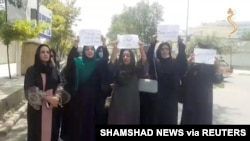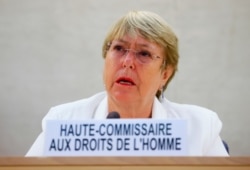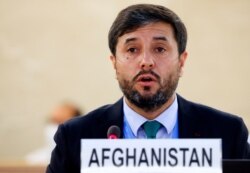Participants at a special session on the human rights situation in Afghanistan have urged the U.N. Human Rights Council to investigate abuses committed by the Taliban and to hold them accountable for their crimes.
U.N. High Commissioner for Human Rights Michele Bachelet kicked off the proceedings. She gave a harrowing account of the many credible reports her office has received of violations committed by the Taliban against the Afghan civilian population, including summary executions and restrictions on the rights of women.
She noted commitments made by the Taliban to respect the rights of women, and of ethnic and religious minorities. She said they also have pledged to refrain from reprisals against Afghans who worked with the international community. She said the onus now was on the Taliban to honor those commitments.
"I urge this [human rights] council to take bold and vigorous action, commensurate with the gravity of this crisis, by establishing a dedicated mechanism to closely monitor the evolving human rights situation in Afghanistan, including, in particular, the Taliban’s implementation of its promises, with a focus on prevention," she said.
Bachelet said united action by member states will be an important signal to the Taliban that a return to past practices will not be accepted by the international community.
Shaharzad Akbar, chair of the Afghanistan Independent Human Rights Commission, expressed disappointment at the council’s failure to create fact-finding missions to monitor, report and gather evidence of past Taliban violations and abuses.
She said the council cannot conduct business as usual considering the prospect of more unspeakable abuses by the Taliban rulers of her country.
"The least the special session can do is to illustrate through actions to Afghans that they will not look away, that the world is committed to at least a credible, strong and well-resourced mechanism to document the abuses and act as a deterrent,” she said.
Akbar called the draft resolution tabled at the special session a travesty considering the well documented violations and war crimes committed by the Taliban against women and girls, human rights defenders, and journalists among others.
She added Afghan activists on the ground who face direct threats to their lives demand and deserve better than the council’s tepid response.
"To be frank with you, you are failing them. But now, today, not next month, not next March, you have the chance to redeem yourselves. Please take it. Please ensure this session has a credible and strong outcome," she said.
Human Rights Watch agreed with that position. In a statement, the international rights group said there were ominous signs that U.N. member countries may fail to show the leadership needed.
It said a text resolution drafted by Pakistan as leader of the Organization of Islamic Cooperation recommended the weakest possible response to the serious abuses unfolding now. The text, it said, did not call for an investigation or monitoring body, just a future discussion and report on the human rights situation in the country.
It warned failure to act now would tarnish the council’s credibility not just in Afghanistan, but in other human rights crises.
The United Nations has not recognized the Taliban as the legitimate rulers of Afghanistan. So, the ambassador to the U.N. in Geneva of the former Afghan government took the floor.
Nasir Ahmad Andisha described the critical recent developments in his country and called for international support. He said his country must not be abandoned and forgotten by the world. He said the lives, rights and dignity of his people depended upon that.
"This is a key moment for the Human Rights Council to embrace the preventative role that it has many times spoken about," he said. "We still hope, and we urge you. that the outcome of this session delivers a strong message to all parties including the Taliban that abuses and violations of Human Rights Law and International Humanitarian Law, undermines both peace and justice and will have consequences."
U.S. Department of State Undersecretary for Civilian Security, Democracy, and Human Rights Uzra Zeya welcomed the council’s urgent attention to the dire human rights situation in Afghanistan. She said the protection of civilians must remain paramount. She condemned attacks on Afghans seeking to aid the U.S. and said all Afghans and foreign nationals who wished to depart must be allowed to do so safely.
The U.S. joined a group of more than 60 countries that demanded the immediate cessation of targeted killings of women’s rights defenders. The group also called on those in power in Afghanistan to guarantee women’s and girls’ rights to education, work, health, and freedom of movement.






